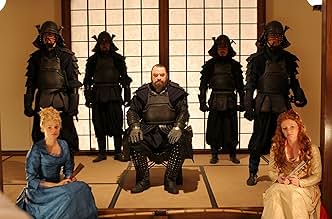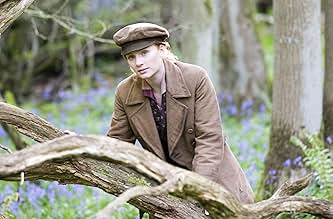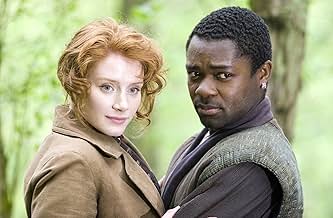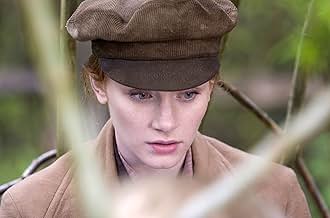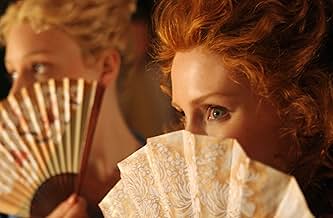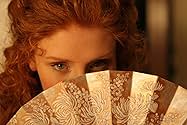Une fille du puissant duc doit montrer son courage et son inventivité pour être avec l'homme qu'elle aime.Une fille du puissant duc doit montrer son courage et son inventivité pour être avec l'homme qu'elle aime.Une fille du puissant duc doit montrer son courage et son inventivité pour être avec l'homme qu'elle aime.
- Director
- Writers
- Stars
- Prix
- 1 victoire et 6 nominations au total
Nobuyuki Takano
- Charles
- (as Nobuyuki "Daishi" Takano)
Avis en vedette
How dumb do you have to be to watch a Shakespeare film and then complain, like certain reviews here, that it has Shakespeare's dialogue? What did you expect? Apart from anything else, the dialogue - the poetry of the greatest-ever writer of English - is the whole point. Without that, you have only a highly improbable story made up of contrived situations connected together only tenuously. With it - if it is well performed - a golden, magical glow of love and wit. If you don't understand it, rather than expecting it to be dumbed down to your level you should be prepared to put a bit of work in, read the play over slowly and puzzle it out - or else just admit that it is over your head. But don't blame the play for your own deficiencies.
I'm not fond, though, of the modern fashion for productions with apparently random, irrelevant concepts - in this case old-time Japan - to which Branners adds by his insistence on casting American stars who (inevitably) can't really handle the dialogue.
I'm not fond, though, of the modern fashion for productions with apparently random, irrelevant concepts - in this case old-time Japan - to which Branners adds by his insistence on casting American stars who (inevitably) can't really handle the dialogue.
Kenneth Branagh takes the Bard to Japanese setting the time being the late 19th century.As You Like It (2006) tells about Rosalind, the daughter of banished duke.She is raised by his younger brother Frederick, who took over dukedom.She falls for a young man named Orlando, but also she is soon banished by Frederick.Her cousin Celia leaves with her.They go to the forest of Arden, and they take the fool Touchtone with them.And also, Rosalind is disguised as a boy, and she goes by the name of Ganymede, while Celia goes by the name of Aliena.Also Orlando happens to be in the same forest, fleeing the wrath of his older brother.William Shakespeare wrote the original, pastoral comedy, around 1599 or 1600.I read it some time ago.Shakespeare sure knew how to write of love, and it is all well adapted to the screen here.And there are also mighty fine players in this play.Let's start with Bryce Dallas Howard, whose work as a boy is almost as good as her work as a girl.Romola Garai is a real treat as Celia.Brian Blessed is great both as Duke Frederick as he is as Duke Senior.David Oyelowo is terrific as Orlando De Boys.Adrian Lester is very good as his brother Oliver.Richard Briers gives a very fine performance of Adam.Alfred Molina is superb as Touchtone.And so is Janet McTeer as his love interest Audrey.Kevin Kline is brilliant as Jaques.Jade Jefferies is marvelous as Phebe.This may not be the funniest thing I've ever seen, nor was the play the funniest thing I've ever read.Maybe I'm too modern and should think more medievally.But it all works because of the words, and the grand feelings it has to offer.And sure I found myself slightly amused when Phebe went head over heels for Rosalind/Ganymede.Branagh shows us that Shakespeare works also in a new environment, in a new era.
Seeing As You Like It, William Shakespeare's romantic comedy of mistaken identity brought back memories of an amateur production of the Carousel Theater here in Vancouver many years ago in which my son David played a small role. It was a wonderful presentation that thoroughly captured the genius of Shakespeare's delightful imagination. Unfortunately, the new filmed version by Kenneth Branagh with its big budget and professional cast is not in the least bit as convincing or entertaining. It is miscast, over produced, over acted, and simplistic with its multi-layered plot made easier to follow than Sesame Street.
Set in Japan in the 19th Century after the country was opened to the West as a trading partner, the royalty of England have been reinvented as wealthy merchants living on the Japanese seacoast. Neither the opulent backgrounds nor the conceit of the script, however, has any impact on either understanding or enjoyment of the play and the setting seems to be simply a marketing decision not an artistic one. The film opens with a kabuki scene at the court of Duke Senior (Brian Blessed). His brother Frederick, also played by Blessed with black hair, interrupts the proceedings to forcibly overthrow his brother's dukedom and the elder Duke is banished to the Arden Forest. Orlando, played by the Nigerian born David Oyelowo, and his brother Oliver (Adrian Lester) then proceed to fight over their position in the court.
Oliver, aligned with Frederick, entices his brother to take on a 300-pound sumo wrestler to all but certain doom but, as the script will have it, the underdog prevails in spite of a weight differential of about 150 pounds. In addition to being victorious at sport, he also falls for one of his well-wishers, the attractive Rosalind (Bryce Dallas Howard), daughter of Duke Senior. Fearful of her safety at the court, Rosalind, pretending to be a man and, taking the name of Ganymede from the handsome cup bearer to the Gods in Greek mythology, sneaks out with her cousin Celia (Romola Garai) and the clown Touchstone (Alfred Molina) to seek out her father in the Forest of Arden. Soon they are joined by Orlando who also fears for his life after a fight with his brother Oliver over their inheritance.
Before long, a bunch of other personages wander into the film including a melancholy philosopher named Jaques (Kevin Kline) who is described as "an exiled courtier", a young shepherd Silvius (Alex Wyndham) who pursues his reluctant girlfriend Phebe (Jade Jefferies), and others. Curiously, there are two characters named Jaques and two named Oliver, something that most writers would go to any length to avoid. The play is best noted for the cynical soliloquy chronicling the seven ages of man, "All the world's a stage and all the men and women merely players: They have their exits and their entrances, and one man in his time plays many parts", delivered with properly dour expression by Kline.
It would not be a Shakespearean comedy without some gender confusion and Rosalind, after noticing Orlando's love poems neatly positioned on trees all over their neck of the woods, knows that Orlando loves her. Approaching Orlando in her boy disguise as Ganymede, Rosalind endeavors to teach him the finer points of courtship if he would just pretend that he is a she. She uses her charm to seduce Orlando, but also is drawn reluctantly into a relationship with the shepherdess Phebe. In Elizabethan conventions, this meant that a boy playing the girl Rosalind would dress as a boy and then be wooed by another boy playing Phebe.
Quite naturally, this being a comedy and all, everyone ends up happy, (dramatized in a finale of the utmost silliness by Branagh) except for Jaques who, in character, decides not to return to the court. All the pieces are in place for the film to be successful but there are key elements that work against it. For the play to work at all, Rosalind has to be believable as a young man. If she is not, Orlando looks like a complete fool, and the play is robbed of its intended homoerotic playfulness. In this case, Branagh does not even attempt to have Rosalind look masculine and the scenes with Orlando in which he/she is teaching him how to express his love are unconvincing (unless you read it that Orlando goes along with the ruse and the author is simply making a statement about role playing, the masks people wear (himself?) in life, and the inauthenticity of self).
Rosalind is supposed to be pure, innocent, perhaps a little naïve but definitely virtuous. Howard, however, is very un-maiden like in appearance and manner and lacks any noticeable chemistry with her lover. She tries so hard to put the correct inflections in the words that she robs them of whatever poetry they might have had, conveying the impression that she is trying out eagerly for a grammar school play. This is Branagh's fifth attempt to put Shakespeare on film and I'm sure it won't be his last. After achieving considerable artistic but not financial success with the first three, he has opted in this latest film for less of an artistic statement than an overtly commercial approach. Love's Labours Lost was an unmitigated disaster scorched by the critics and shunned by audiences. Unfortunately, As You Like It may follow in its path.
Set in Japan in the 19th Century after the country was opened to the West as a trading partner, the royalty of England have been reinvented as wealthy merchants living on the Japanese seacoast. Neither the opulent backgrounds nor the conceit of the script, however, has any impact on either understanding or enjoyment of the play and the setting seems to be simply a marketing decision not an artistic one. The film opens with a kabuki scene at the court of Duke Senior (Brian Blessed). His brother Frederick, also played by Blessed with black hair, interrupts the proceedings to forcibly overthrow his brother's dukedom and the elder Duke is banished to the Arden Forest. Orlando, played by the Nigerian born David Oyelowo, and his brother Oliver (Adrian Lester) then proceed to fight over their position in the court.
Oliver, aligned with Frederick, entices his brother to take on a 300-pound sumo wrestler to all but certain doom but, as the script will have it, the underdog prevails in spite of a weight differential of about 150 pounds. In addition to being victorious at sport, he also falls for one of his well-wishers, the attractive Rosalind (Bryce Dallas Howard), daughter of Duke Senior. Fearful of her safety at the court, Rosalind, pretending to be a man and, taking the name of Ganymede from the handsome cup bearer to the Gods in Greek mythology, sneaks out with her cousin Celia (Romola Garai) and the clown Touchstone (Alfred Molina) to seek out her father in the Forest of Arden. Soon they are joined by Orlando who also fears for his life after a fight with his brother Oliver over their inheritance.
Before long, a bunch of other personages wander into the film including a melancholy philosopher named Jaques (Kevin Kline) who is described as "an exiled courtier", a young shepherd Silvius (Alex Wyndham) who pursues his reluctant girlfriend Phebe (Jade Jefferies), and others. Curiously, there are two characters named Jaques and two named Oliver, something that most writers would go to any length to avoid. The play is best noted for the cynical soliloquy chronicling the seven ages of man, "All the world's a stage and all the men and women merely players: They have their exits and their entrances, and one man in his time plays many parts", delivered with properly dour expression by Kline.
It would not be a Shakespearean comedy without some gender confusion and Rosalind, after noticing Orlando's love poems neatly positioned on trees all over their neck of the woods, knows that Orlando loves her. Approaching Orlando in her boy disguise as Ganymede, Rosalind endeavors to teach him the finer points of courtship if he would just pretend that he is a she. She uses her charm to seduce Orlando, but also is drawn reluctantly into a relationship with the shepherdess Phebe. In Elizabethan conventions, this meant that a boy playing the girl Rosalind would dress as a boy and then be wooed by another boy playing Phebe.
Quite naturally, this being a comedy and all, everyone ends up happy, (dramatized in a finale of the utmost silliness by Branagh) except for Jaques who, in character, decides not to return to the court. All the pieces are in place for the film to be successful but there are key elements that work against it. For the play to work at all, Rosalind has to be believable as a young man. If she is not, Orlando looks like a complete fool, and the play is robbed of its intended homoerotic playfulness. In this case, Branagh does not even attempt to have Rosalind look masculine and the scenes with Orlando in which he/she is teaching him how to express his love are unconvincing (unless you read it that Orlando goes along with the ruse and the author is simply making a statement about role playing, the masks people wear (himself?) in life, and the inauthenticity of self).
Rosalind is supposed to be pure, innocent, perhaps a little naïve but definitely virtuous. Howard, however, is very un-maiden like in appearance and manner and lacks any noticeable chemistry with her lover. She tries so hard to put the correct inflections in the words that she robs them of whatever poetry they might have had, conveying the impression that she is trying out eagerly for a grammar school play. This is Branagh's fifth attempt to put Shakespeare on film and I'm sure it won't be his last. After achieving considerable artistic but not financial success with the first three, he has opted in this latest film for less of an artistic statement than an overtly commercial approach. Love's Labours Lost was an unmitigated disaster scorched by the critics and shunned by audiences. Unfortunately, As You Like It may follow in its path.
Here's one of the most intriguing challenges in all the lands of imagination.
Shakespeare invented much of what it means to be a modern human. But he did so in a very constrained way of communicating. The plays were all about language and geometry on how the come to us, and within that vessel he grew images. That sparseness was what allowed him to shape the language so finely, thus creating the poetic spins that find valence in us.
Okay. If you have seen Shakespeare done as it originally was, you'll know what I mean. The plays work well when read silently or aloud as well. But how to translate to cinema? How to take something that is not visual until it enters us, and make it visual before it enters us and make the same magic?
I love how people have tried. Most modern stage productions follow this cinematic challenge as well because now we are a visual society.
Jarman, Greenaway, Luhrman and Taymor have done marvelous things with this challenge. Branaugh is from a different stripe, a sideways approach to this problem. He sometimes moves into pure cinema (Kate's mirrored Ophelia rant, the horses in "Much Ado") but he's primarily worried about stagecraft as theatrically defined. Here he does something different, something so ambitious I'm trilled to be alive for it. Its so clever.
I did not see this at an appointed time, but stumbled on it after a discouraging day. In a sense, it saved my life. It really did. I watched the whole thing with one of those openmouthed grins.
Here's what he did. He transported the setting to Japan and adjusted everything accordingly. Simple idea.
No, its not just Shakespeare with different clothes. Its not just the plot fleshed out with some other setting. Its a translation to a visual expression. Japan has spent a few hundred years building, refining and constraining a visual grammar in much the same way that Northern Europeans did with language. We lose much of what we associate with the plays, that verbal poetry. What we get in its stead is something similar but visually rooted. To establish this of course you have to "show strong" in the beginning, and he does with a completely wordless intrusion, an invasion of guess what? A play!
This Rosalind is exquisite, someone who knows how to shape the space around her the way British actors carefully shape their words. She anchors the whole thing, including an amazing epilogue. Really, you should save this for when you need your life saved, when you need to stroke down melancholy burrs.
Though Branaugh ends with his familiar happydance, by then you will be ready for it, ready to fall in love all over again.
Ted's Evaluation -- 3 of 3: Worth watching.
Shakespeare invented much of what it means to be a modern human. But he did so in a very constrained way of communicating. The plays were all about language and geometry on how the come to us, and within that vessel he grew images. That sparseness was what allowed him to shape the language so finely, thus creating the poetic spins that find valence in us.
Okay. If you have seen Shakespeare done as it originally was, you'll know what I mean. The plays work well when read silently or aloud as well. But how to translate to cinema? How to take something that is not visual until it enters us, and make it visual before it enters us and make the same magic?
I love how people have tried. Most modern stage productions follow this cinematic challenge as well because now we are a visual society.
Jarman, Greenaway, Luhrman and Taymor have done marvelous things with this challenge. Branaugh is from a different stripe, a sideways approach to this problem. He sometimes moves into pure cinema (Kate's mirrored Ophelia rant, the horses in "Much Ado") but he's primarily worried about stagecraft as theatrically defined. Here he does something different, something so ambitious I'm trilled to be alive for it. Its so clever.
I did not see this at an appointed time, but stumbled on it after a discouraging day. In a sense, it saved my life. It really did. I watched the whole thing with one of those openmouthed grins.
Here's what he did. He transported the setting to Japan and adjusted everything accordingly. Simple idea.
No, its not just Shakespeare with different clothes. Its not just the plot fleshed out with some other setting. Its a translation to a visual expression. Japan has spent a few hundred years building, refining and constraining a visual grammar in much the same way that Northern Europeans did with language. We lose much of what we associate with the plays, that verbal poetry. What we get in its stead is something similar but visually rooted. To establish this of course you have to "show strong" in the beginning, and he does with a completely wordless intrusion, an invasion of guess what? A play!
This Rosalind is exquisite, someone who knows how to shape the space around her the way British actors carefully shape their words. She anchors the whole thing, including an amazing epilogue. Really, you should save this for when you need your life saved, when you need to stroke down melancholy burrs.
Though Branaugh ends with his familiar happydance, by then you will be ready for it, ready to fall in love all over again.
Ted's Evaluation -- 3 of 3: Worth watching.
As You Like It is my favorite Shakespearean comedy, and my high expectations of the new Branagh version were not put to shame. Set in a lush, beautiful forest in an imaginary old Japan, populated by people of all races, this version is an innovative and modern one rather than a conventional and classical one - and it works.
The female main characters, Rosalind, Celia, Phebe and Audrey, are all immensely good, effortlessly throwing around both unbridled enthusiasm and unwavering character acting. In fact, Celia is near to outshining Rosalind; only her obviously bleached hair detracts from her charm.
The male characters are, sadly, far less distinctive, with the exception of Alfred Molina's Touchstone, who's delightfully silly - almost too much so. Kevin Kline's Jacques is not bad either, but he doesn't really steal the limelight to any great extent, the way he perhaps should. In a production as colorful as this one, Jacques greyness gets a bit lost.
(Edit: I will say that this version gains from repeated viewings. It is a great modern adaptation of Shakespeare's perhaps most joyous comedy.)
I did feel that a lot of the original text was missing, and this, as is so often the case with Shakespeare movies, is this production's worst shortcoming. Not enough of the delightful Rosalind rhymes which almost define the play ("Winter garments must be lined / So must slender Rosalind") are included, which is a grave, grave error in disposition. If this play was often made into movies, that judgment might be justified, but since the play is adapted so rarely, it cannot be.
The overall filming and cinematography are excellent, however, with plentiful gentle camera movement and many close-ups, focusing admirably on the strong emotions exchanged between the characters, and the language is fluid as well as florid, spoken in a very modern, sometimes even casual, tone, as we have come to expect from Branagh's very accessible Shakespeare films.
We are many who wonder why this film has not received a wide cinematic release. It has been shown only on a few film festivals, and this January it will be out on DVD, at least in Italy. Is it going straight to DVD without a run in international theaters? Why?? Is it really seen to be so obscure and uncommercial that no distribution company will commit to it? If so, distributors should be ashamed.
My rating: 9 out of 10.
The female main characters, Rosalind, Celia, Phebe and Audrey, are all immensely good, effortlessly throwing around both unbridled enthusiasm and unwavering character acting. In fact, Celia is near to outshining Rosalind; only her obviously bleached hair detracts from her charm.
The male characters are, sadly, far less distinctive, with the exception of Alfred Molina's Touchstone, who's delightfully silly - almost too much so. Kevin Kline's Jacques is not bad either, but he doesn't really steal the limelight to any great extent, the way he perhaps should. In a production as colorful as this one, Jacques greyness gets a bit lost.
(Edit: I will say that this version gains from repeated viewings. It is a great modern adaptation of Shakespeare's perhaps most joyous comedy.)
I did feel that a lot of the original text was missing, and this, as is so often the case with Shakespeare movies, is this production's worst shortcoming. Not enough of the delightful Rosalind rhymes which almost define the play ("Winter garments must be lined / So must slender Rosalind") are included, which is a grave, grave error in disposition. If this play was often made into movies, that judgment might be justified, but since the play is adapted so rarely, it cannot be.
The overall filming and cinematography are excellent, however, with plentiful gentle camera movement and many close-ups, focusing admirably on the strong emotions exchanged between the characters, and the language is fluid as well as florid, spoken in a very modern, sometimes even casual, tone, as we have come to expect from Branagh's very accessible Shakespeare films.
We are many who wonder why this film has not received a wide cinematic release. It has been shown only on a few film festivals, and this January it will be out on DVD, at least in Italy. Is it going straight to DVD without a run in international theaters? Why?? Is it really seen to be so obscure and uncommercial that no distribution company will commit to it? If so, distributors should be ashamed.
My rating: 9 out of 10.
Le saviez-vous
- AnecdotesThis was the ninth and final film directed by Kenneth Branagh in which Richard Briers stars. The others are Henry V (1989), Les amis de Peter (1992), Swan Song (1992), Beaucoup de bruit pour rien (1993), Frankenstein d'après Mary Shelley (1994), Au beau milieu de l'hiver (1995), Hamlet (1996) and Peines d'amour perdues (2000).
- GaffesLions are not native to Japan. The lion is a carryover from the original play, which was set in a generic European country at an indeterminate time in the Middle Ages. Even that didn't make much sense, as lions have been extirpated from the main part of Europe since the 4th century AD, and from the Caucasus since the 10th century. But many Europeans, possibly including William Shakespeare, didn't know that lions weren't around anymore.
- Citations
Touchstone: The fool doth think he is wise, but the wise man knows himself to be a fool.
- Générique farfeluThe picture seems to end without the play's Epilogue. Then, the closing credits begin, when they are suddenly interrupted by Bryce Dallas Howard, still in character as Rosalind, who then is seen speaking the Epilogue as she begins to walk to her trailer, drinking a cup of coffee along the way. After the speech, Kenneth Branagh can be heard off-screen saying "Aaaand...cut!" After this, the closing credits resume.
- Autres versionsThe version shown on cable television has been formatted to the aspect ratio commonly used in HDTV production (that is, anywhere from 1.78:1 to 1.85:1), while the version released to movie theatres was released in the typical CinemaScope/Panavision aspect ratio (2.39:1). It is the theatrical version which has been issued on DVD. Since the film was made using the Super 35 format, it was possible to make versions of the film in different aspect ratios.
- ConnexionsFeatured in 14th Annual Screen Actors Guild Awards (2008)
- Bandes originalesUnder the Greenwood Tree
Composed by Patrick Doyle
Lyrics by William Shakespeare
Performed by Patrick Doyle and London Symphony Orchestra
Meilleurs choix
Connectez-vous pour évaluer et surveiller les recommandations personnalisées
- How long is As You Like It?Propulsé par Alexa
Détails
- Date de sortie
- Pays d’origine
- Langue
- Aussi connu sous le nom de
- As You Like It
- Lieux de tournage
- sociétés de production
- Consultez plus de crédits d'entreprise sur IMDbPro
Box-office
- Brut – à l'échelle mondiale
- 563 162 $ US
- Durée2 heures 7 minutes
- Couleur
- Mixage
Contribuer à cette page
Suggérer une modification ou ajouter du contenu manquant




